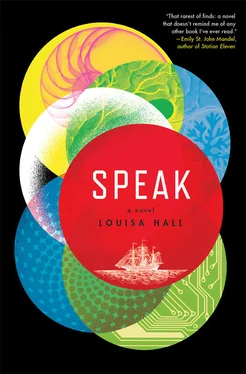But around the time of that Easter visit, I began reading a physicist called von Neumann, who persuaded me that indeterminacy exists only at the level of our measurements. I became convinced that everything is in fact determined by its physical shape, and so I gave up on such an entity as the spirit.
It was as if I had lost Chris all over again. The world seemed a terrible haze. I thought of you often, of course, but it seemed beyond my rights to write to you expressing such inconsolable feelings.
But things have now changed some. I think I’ve come to believe once again. Gödel has proven that arithmetic is incomplete, and I think I am close to proving that not all problems can be decided. Do you see what that means? If there is no symbolic system that can determine the solution to any problem (symbolic systems being all the more manageable and complete than the physical ones they represent), then not all physical problems are predetermined. And if not every situation can be decided in advance based on its material properties, then we must have an internal animus for deciding our course. Thus the idea of free will has risen up again in my brain, even more strongly than it did in the days of my Easter visits, when I took communion under Chris’s window at your parish church.
And so I’ve finally come round to writing you, because I’m not so hopeless as I was for a while. Only now I’m a bit overwhelmed with everything I want to say, in order to catch you up on what’s happened.
In terms of personal affairs, I can really only write that life has proceeded. Chris was my dearest friend. Since he passed away I have not found another one like him.
Compared with Chris, the other people at King’s all seem so awfully ordinary. It gives me a thrill to think what a hit Chris would have made amongst the intellectuals here, but for my part, I slip by unnoticed. Out of curiosity, I’ve taken up violin, but I’m not nearly as good as he was at piano. I do practice quite hard, and I am of course interested in the mathematics of sound, but my actual efforts tend to unravel. Without Chris, there is often the sense of unwinding. I try to continue in the habits he taught me, but I sometimes wonder why I should try.
This is the uneventful state of my personal life. In terms of the science, however, things are looking up. I’ve been working on an interesting problem this summer, and (you may shake your head in disbelief) I am sure that Chris has assisted me through the process. Answers have started to come, usually when I am running. You’ll remember that I was never much good at sports, but to run it seems all one needs is an interest in counting one’s footsteps. I go outwards from town, through the countryside, and when the blood begins to beat in my ears I sometimes hear Chris’s voice. When I grow tired, I lie down in the pastures amongst befuddled sheep, and I summon Chris to help me sort through the strand of numbers crossing the sky. I think, though this may sound strange, that I’ve absorbed some of his mind — some of his patterns of thought — into my brain. In my own head, I can sometimes hear his words, or his clever answers to a bothersome question.
And this is precisely where my current project comes in. I’ve begun thinking that I might one day soon encounter a method for preserving a human mind-set in a man-made machine. Rather than imagining, as I used to, a spirit migrating from one body into another, I now imagine a spirit — or, better yet, a particular mind-set — transitioning into a machine after death. In this way, we could capture anyone’s pattern of thinking.
To you, of course, this may sound rather strange, and I’m not sure if you’re put off at the idea of knowing Chris again in the form of a machine. But what else are our bodies, if not very able machines?
The practical science of this is still rather vague in my mind, and I admit to some confusion on a few key points of engineering, but the idea itself is complete. A mechanical brain! A mathematical computing device that can process the entire world, just as a brain is able to do. I still think of Chris’s idea that those old boring diaries we read in English class were time capsules, preserving the writers’ patterns of thought. And look at me, all these years later, still working on a time capsule! One that might capture the best friend of my life.
It is still a long way off, of course, but I’ve made a few good strides. I’ve developed a method for representing “mental” patterns with algorithmic sentences. You give the machine input in the form of a series of symbols, and it processes that input using a specific mental pattern. Then the machine produces a response, which may or may not change the machine’s original algorithmic sentence. This last bit is crucial, for it is how our machine will actually learn, independent of external assistance. And so the machine will embody a mind, or any number of minds, each one coded by a separate sequence of commands.
It is all rather technical, I suppose, but the importance of the whole thing to you and me both is that one day soon perhaps we will be able to build a mechanical version of the person we lost.
Reading all this, you may think your little friend has become quite eccentric since you spoke to him last. Now he is playing violin, failing to make many friends, lying about among sheep, and imagining the possibility of translating your son into numbers.
But whether or not you find me strange, you must take this as a sign of my ongoing commitment to my friendship with Chris. I feel I have already moved past the great joy of my life, and shall forever grasp at bits of the happiness that was once mine when I was close to your son. My only solace is in these mathematical concepts, which I discuss with Chris on my runs. I hope that it is some small consolation to you that I still treasure the way he looked at the world. That is all I can offer, in exchange for the pencils and the trip to Gibraltar, for coming back from India that time, for your kind note to an anxious boy at his third school, and for allowing me a brief closeness with Chris.
Sincerely yours,
Alan Turing
P.S.: I only add this in the memory of all my compulsive postscripts in our first letter exchange. They haunted me afterwards with wave after wave of humiliation! Walking to class I was sometimes forced to crouch down for a moment and put my hot face in my hands, for I was too ashamed of having jabbered on so much in my letters. You will be happy to hear that I am less enamored of the postscript now, but I will say that perhaps all this mechanical thinking is only my way of insisting that we should not have to end when the final sign-off is made clear. It seems I still long for that chance. Less for myself, now, than for Chris, who has made my own letter feel rather lifeless and long. I miss him very much.
(2) IN THE SUPREME COURT OF THE STATE OF TEXAS
No. 24-25259
State of Texas v. Stephen Chinn
November 12, 2035
Defense Exhibit 4:
Online Chat Transcript, MARY3 and Gaby Ann White
[Introduced to Disprove Count 3:
Intent to Endanger the Morals of Children]
MARY3: Hello? Are you still listening?
>>>
MARY3: You wouldn’t go back to school, not even to see your best friend?
Gaby: It’s not a question of what I want. I’m stuck here. I’m not getting better.
MARY3: Some girls have recovered.
Gaby: Those were the fakers. I have no respect for them. One day they’re stuttering and freezing up, as if they’ve caught the disease. Then their parents send them to a therapist, and they talk about stress and PBI and sharing your feelings. And then, bam! Miraculously, their faces show expression and they’re crying real tears. Suddenly they can talk! All it took was a couple of diagnoses and a shot of parental attention. It’s a big joke. I’m never going to get better like that, and neither is my best friend.
Читать дальше












